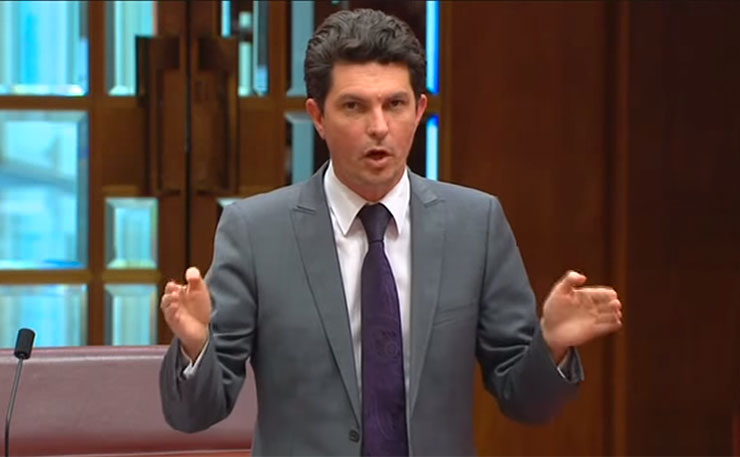With data retention laws about to kick in, New Matilda speaks to its major parliamentary opponent about what it means for online freedoms and how to beat the system. Max Chalmers reports.
With Parliament resuming, Senator Scott Ludlam is back in Canberra today, primed for a week that will see legislation he fought to the bitter end finally take effect.
From tomorrow, companies that provide your phone and internet services will be required by law to keep records of a range of your activities for two years, and provide them to various government agencies and staff without a warrant.
The laws garnered a huge response from civil and online rights groups, with Ludlam becoming the parliamentary face of a spirited campaign against the changes, an effort torpedoed by the bipartisan consensus of Labor and the Coalition.
Though the fight to stop the legislation was lost in March, Ludlam and his allies are now encouraging average Australians to learn how to adapt to an online environment in which their data is indiscriminately collected and held.
“I think the first thing to note is that there is nothing illegal about circumventing data retention,” he says.
“That’s an important point because there have been a few raised eyebrows about, well, ‘why are you sharing these tips, this thing has been passed into law.’”
Answering that question has been made easier for Ludlam by the man who just rolled Tony Abbott.
“There’s nothing illegal about any of the technology we’re proposing, to the point where the Prime Minister – as Communications Minister at the time – Malcolm Turnbull recorded that famous interview with David Speers where he went through a whole range of instant messaging tools that could be used that would effectively leave no data trace.”
That would be this interview.
With Turnbull’s advice still ringing in your ears, here are some of Ludlam’s quick tips for keeping your privacy intact. We should note that this is far from an all-consuming guide, but we’ll get to that.
1. Don’t stuff up the basics
“Start with really basic data hygiene things like choosing strong passwords and don’t use the same password for every single service,” says Ludlam.
“It sounds a bit banal but it’s actually really tremendously important. Not for countering five-eyes surveillance by the NSA, which fortunately for most people isn’t going to be their primary worry, but just for having your material ripped off. Choose a strong password and keep that safe.”
2. Texts and calls are dead, long live encrypted messaging
From Tuesday, depending on your service provider, two years worth of who you have been calling and texting, when you’re doing it, and your location at the time can be snooped without a warrant by a (growing) range of government agencies and officers.
But by using applications that send messages online and protect them with encryption you can prevent this information being tracked as easily. Your service provider will know you’ve connected to the app, but not who you’ve messaged on it.
For messaging Ludlam recommends ‘Signal’, and points to Telegram as a solid backup. “Rather than sending text messages, which would leave a trace on Telstra’s server for example, if you use an instant messaging service like Signal that accrues a data charge, but it’s not leaving a trace as to who you’re messaging and when.
“Depending on the way it is set up and probably depending on your Internet Service Provider, it might also record how much material was exchanged – how much traffic was exchanged – but it doesn’t tell you who you were communicating with or how many messages were transacted or whether some of them had attachments or whether some of them had photos, so it’s just a block of data exchanged with that server.”
3. Start using a VPN
If you haven’t started getting your head around Virtual Private Networks (VPNs) yet then now is the time to start. Using one helps protect your online activity by masking your IP address, which would otherwise link your internet use with your real word identity and location.
“For regular web traffic, put a VPN on your phone and then just remember to move your location around from time to time,” says Ludlam.
For some quick guides with more on VPNs see here, here and here.
4. While you’re at it, start using Tor as well
By using Tor software you can add a layer of anonymity to your web browsing, helping to mask it. The widely recommended service boasts (accurately) that it is used by journalists, activists, and those trying to access websites censored in their own country.
Chuck them a few bucks while you’re at it, says Ludlam.
5. Get educated
There are plenty of resources popping up as mass-surveillance grows and the amount of information kept on citizens expands.
Ludlam points to the Electronic Frontiers Foundation’s guide as well as privacytools.io as a good start point.

With all that said, Ludlam is keen to remind people that elements of these laws are extremely difficult to protect against.
Your phone, for instance, sends your service provider information about your location.
“That’s actually particularly difficult because if the cell tower doesn’t know where you are, it can’t contact the phone,” he says. “So the idea was that it would record your location everywhere a communication was made, so rather than tracking you at 10 second intervals all day, the cell tower triangulates to within a few tens of meters of where you were when the communication occurred. [The data] is part of the data retention scope, it’s in scope, and I’m not aware of how you mask that.”
Then there’s the bigger picture.
In a post-Snowden world it should be obvious that privacy online is relative; the more you do to protect yourself, the more layers you use, the more private your information is and the greater the number of eyes you’re hiding it from. Keeping some of your data out of the hands of service providers is not the same as keeping clear of the dragnet surveillance the NSA whistleblower helped expose.
Ultimately, Ludlam sees the Snowden revelations and Australia’s own creeping laws as part of the same problem.
“I think the trend that’s of most direct relevance is the tendency towards indiscriminate data retention,” he says. “And it’s what was used to confuse the debate.
“We were told quite correctly that telecommunications data is really important for police work, anti-corruption, and counter-terrorism. That’s true, in my view, that’s a true thing.”
But he says the lesson from Five Eyes – the massive shared surveillance network involving the US, Canada, Australia, the UK, and New Zealand – is that these practices get out of control when “everybody rather than just suspects or persons of interest” is caught up in surveillance.
“That’s the most important thing to note, and where we have a big disagreement with Tony Abbott and the Labor Party, is that it’s data collection on everybody, whether you’re doing anything wrong or not, and the scope is designed to increase.
“So my prediction is we will see a range of additional agencies, additional telecommunications services, and service providers [included], and also probably, we will see an increase in terms of the data retention directives.”
And although the laws are still hours away from coming into effect, the creep has already begun.
When the controversial Border Force Act was passed, just months later it included a provision to give the newly merged customs and immigration body access to the data kept under the legislation.
“It’s not that you’re going to wake up tomorrow in a surveillance dystopia,” says Ludlam.
It’s where Tuesday will place in the long and expanding history of mass surveillance that is at the root of his concerns.
* We hope you like the New Matilda re-design. Please consider subscribing here, to support independent media. Prices start from just $6 per month.
Donate To New Matilda
New Matilda is a small, independent media outlet. We survive through reader contributions, and never losing a lawsuit. If you got something from this article, giving something back helps us to continue speaking truth to power. Every little bit counts.




